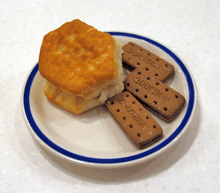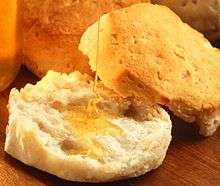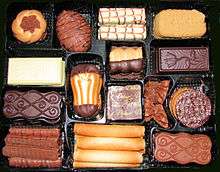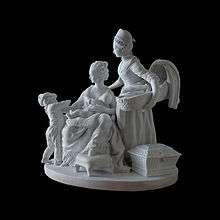Definify.com
Webster 1913 Edition
Biscuit
Bis′cuit
,Noun.
1.
A kind of unraised bread, of many varieties, plain, sweet, or fancy, formed into flat cakes, and bakes hard;
as, ship
. biscuit
According to military practice, the bread or
biscuit
of the Romans was twice prepared in the oven. Gibbon.
2.
A small loaf or cake of bread, raised and shortened, or made light with soda or baking powder. Usually a number are baked in the same pan, forming a sheet or card.
3.
Earthen ware or porcelain which has undergone the first baking, before it is subjected to the glazing.
4.
(Sculp.)
A species of white, unglazed porcelain, in which vases, figures, and groups are formed in miniature.
Meat biscuit
, an alimentary preparation consisting of matters extracted from meat by boiling, or of meat ground fine and combined with flour, so as to form biscuits.
Webster 1828 Edition
Biscuit
BIS'CUIT
,Noun.
1.
A kind of bread, formed into cakes, and baked hard for seamen.2.
A cake, variously made, for the use of private families. The name, in England, is given to a composition of flour, eggs, and sugar. With us the name is given to a composition of flour and butter, made and baked in private families. But the compositions under this denomination are very various.3.
The body of an earthen vessel, in distinction from the glazing.Definition 2026
biscuit
biscuit
English

A soft and flaky American biscuit (2) on the left and a hard British biscuit (1) on the right.

This American biscuit (2) has been broken open to show its interior; honey is being drizzled onto it.

The hard, flat, baked goods in tins like these are sometimes sold as biscuits (1) even in America, not just in the UK.

La Nourrice biscuit (5) after Louis Boizot.
Noun
biscuit (plural biscuits)
- (chiefly Britain, Australia, New Zealand, rare in the US) A small, flat, baked good which is either hard and crisp or else soft but firm: a cookie.
- (chiefly Canada, US) A small, usually soft and flaky bread, generally made with baking soda, which is similar in texture to a scone but which is usually not sweet.
- (Britain) A cracker.
- cheese and biscuits, water biscuits, digestive biscuits
- (nautical) The "bread" formerly supplied to naval ships, which was made with very little water, kneaded into flat cakes, and slowly baked, and which often became infested with weevils.
- A form of unglazed earthenware.
- 2004, Frank Hamer; Janet Hamer, The Potter's Dictionary of Materials and Techniques, 5th edition, London; Philadelphia, Penn.: A & C Black; University of Pennsylvania Press, ISBN 978-0-7136-6408-9, page 248:
- An overfired biscuit has insufficient porosity for glazing.
-
- A light brown colour.
-
biscuit colour:
-
- (woodworking) A thin oval wafer of wood or other material inserted into mating slots on pieces of material to be joined to provide gluing surface and strength in shear.
- (US, slang) A plastic card bearing the codes for authorizing a nuclear attack.
Quotations
For usage examples of this term, see Citations:biscuit.
Usage notes
- In North America, a biscuit is a small, soft baked bread similar to a scone but not sweet. In the United Kingdom, a biscuit is a small, crisp or firm, sweet baked good — the sort of thing which in North America is called a cookie. (Less frequently, British speakers refer to crackers as biscuits.) In North America, even small, layered baked sweets like Oreos are referred to as cookies, while in the UK, only those biscuits which have chocolate chips, nuts, fruit, or other things baked into them are also called cookies.
- Throughout the English-speaking world, thin, crispy, salty or savoury baked breads like these are called crackers, while thin, crispy, sweet baked goods like these and these are wafers.
- Both the US and the UK distinguish crackers, wafers and cookies/biscuits from cakes: the former are generally hard or crisp and become soft when stale, while the latter is generally soft or moist and becomes hard when stale.
Coordinate terms
- (woodworking): dowel, glue strip, spline, finger joint
Derived terms
Terms derived from biscuit
|
|
Translations
small, flat baked good — See also translations at : cookie
|
|
small bread similar to scone
|
cracker — see cracker
ship's "bread"
form of earthenware
light brown colour
|
woodworking: wafer to provide gluing surface
See also
|
French
Etymology
From Old French bescuit, from bescuire, equivalent to bis- + cuit, or from Medieval Latin bis (“twice”) coctus (“cooked”). Compare Italian biscotto, Spanish bizcocho, Portuguese biscoito.
Pronunciation
- IPA(key): /biskɥi/
Noun
biscuit m (plural biscuits)
Derived terms
Italian
Etymology
Noun
biscuit m (invariable)
Anagrams
Romanian
Alternative forms
- biscot (dated)
Etymology
Borrowing from French biscuit.
Noun
biscuit m (plural biscuiți)
Declension
declension of biscuit
| singular | plural | |||
|---|---|---|---|---|
| indefinite articulation | definite articulation | indefinite articulation | definite articulation | |
| nominative/accusative | (un) biscuit | biscuitul | (niște) biscuiți | biscuiții |
| genitive/dative | (unui) biscuit | biscuitului | (unor) biscuiți | biscuiților |
| vocative | biscuitule | biscuiților | ||